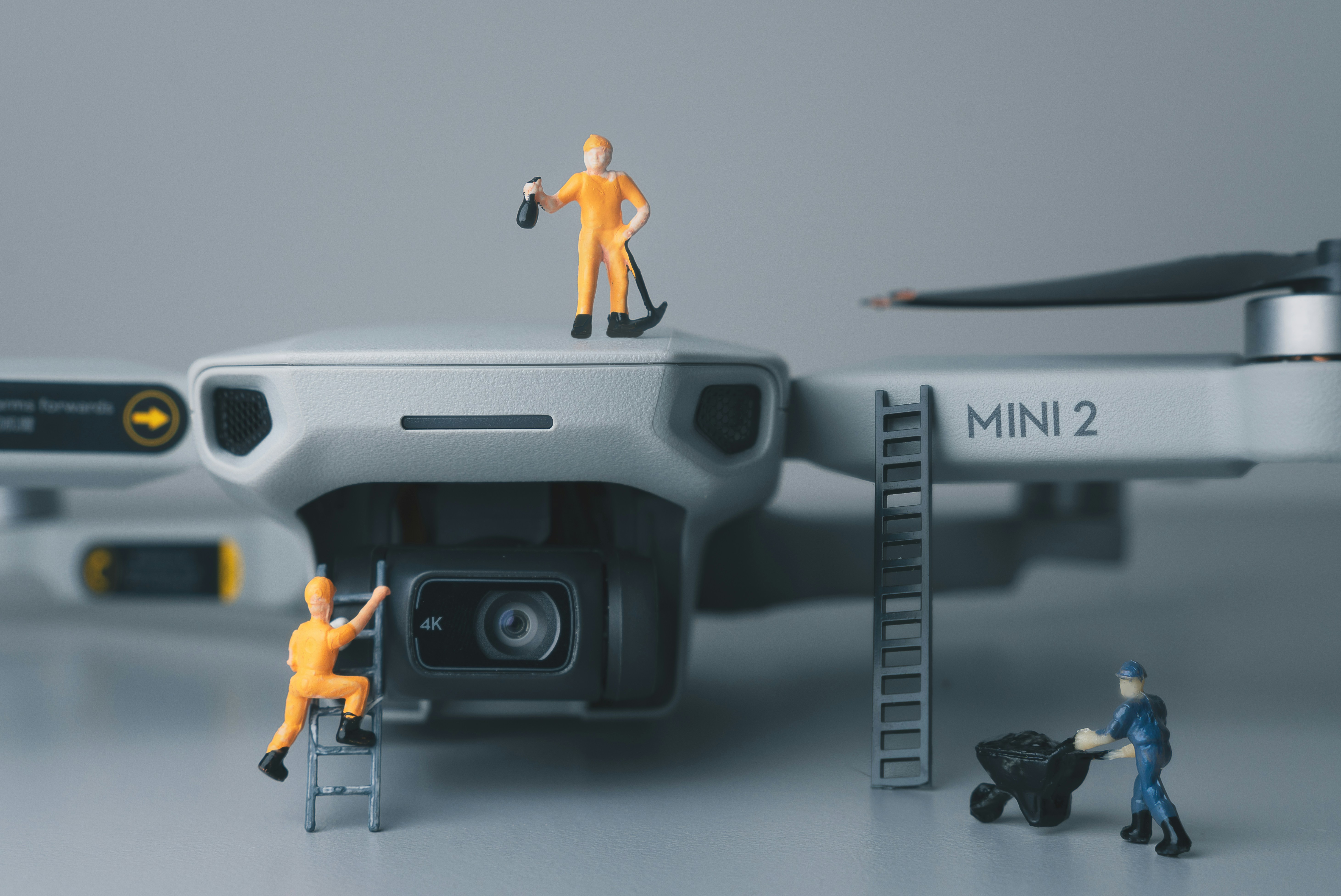:quality(80))
Future Trends in UAV/Drone Jobs: What to Expect in the Next 5 Years in the UK
The Unmanned Aerial Vehicle (UAV) or drone industry in the UK is rapidly evolving, driven by technological advancements, regulatory shifts, and the growing demand for drone-based services. As drones become increasingly integrated across various sectors, the job market surrounding UAVs is set to expand and diversify. For those looking to enter or advance in this industry, understanding the future trends in UAV jobs in the UK is essential. This article explores the emerging trends, new job roles, technological advancements, and the evolving regulatory landscape that will shape the UAV job market over the next five years.
The Expanding Drone Industry in the UK
The UK's drone industry has experienced significant growth in recent years, with applications ranging from agriculture to logistics, public safety, infrastructure inspection, and environmental monitoring. As industries increasingly recognise the value of drones, the demand for skilled professionals to operate, manage, and innovate within this sector is expected to rise. According to a report by PwC, the UK drone economy could be worth £42 billion by 2030, creating around 628,000 jobs. The next five years will be pivotal as the industry prepares for this expansion, with several key trends likely to shape the future UAV job market in the UK.
Emerging Drone Job Roles
As the UAV industry grows, so too will the variety and complexity of job roles within the sector. Here are some emerging roles that job seekers should be aware of:
Drone Data Analyst
Drones are becoming powerful tools for data collection, capturing vast amounts of information through high-resolution cameras, LiDAR, thermal sensors, and other advanced technologies. The role of a Drone Data Analyst involves interpreting this data to provide actionable insights for industries such as agriculture, construction, and environmental science. This role requires a strong background in data science, geographic information systems (GIS), and the specific industry in which the drone is being utilised.UAV Systems Engineer
As drones become more sophisticated, there is a growing need for UAV Systems Engineers who can design, develop, and maintain these complex systems. This role involves working on the integration of hardware and software, ensuring that UAVs can perform specific tasks efficiently and safely. UAV Systems Engineers will be crucial in advancing drone capabilities, such as longer flight times, improved autonomy, and enhanced data processing.Drone Fleet Manager
With the increasing use of drones across industries, managing a fleet of UAVs will become a critical function. A Drone Fleet Manager is responsible for overseeing the deployment, maintenance, and operation of multiple drones, ensuring compliance with regulations and optimising the use of the fleet for maximum efficiency. This role will be especially important in sectors like logistics and public safety, where large-scale drone operations are anticipated.UAV Compliance Officer
As drone usage expands, so does the regulatory landscape. A UAV Compliance Officer ensures that drone operations adhere to national and international regulations, including those related to privacy, safety, and environmental impact. This role will become increasingly important as regulations evolve, requiring professionals who are well-versed in legal and regulatory frameworks, as well as the technical aspects of UAV operations.AI and Automation Specialist
The integration of AI and automation into drone technology is creating new opportunities for professionals who specialise in these areas. AI and Automation Specialists work on developing algorithms and systems that allow drones to operate autonomously, make real-time decisions, and process data more effectively. This role will be critical in pushing the boundaries of what drones can achieve, particularly in sectors like autonomous deliveries, surveillance, and disaster response.
Preparing for the Future: Skills and Training
As the UAV industry evolves, so too must the skill sets of those looking to work in this field. Here are some key areas where job seekers can focus their training and development:
Data Science and Analytics
With the growing importance of data in drone operations, skills in data science and analytics will be highly sought after. Understanding how to process and analyse large datasets, particularly those collected by drones, will be crucial for roles like Drone Data Analyst and UAV Systems Engineer. Familiarity with tools like Python, R, GIS software, and machine learning algorithms will be invaluable.AI and Machine Learning
As AI becomes more integrated into drone technology, professionals with expertise in AI and machine learning will be in high demand. This includes understanding how to develop and implement algorithms that allow drones to perform tasks autonomously. For roles such as AI and Automation Specialist, knowledge of neural networks, deep learning, and computer vision will be essential.Regulatory Knowledge
The regulatory environment for drones is complex and constantly evolving. Professionals looking to enter the UAV industry should familiarise themselves with current regulations and stay informed about upcoming changes. Certifications in UAV operations and a strong understanding of legal and regulatory frameworks will be important for roles like UAV Compliance Officer and Drone Fleet Manager.Engineering and Technical Skills
For those interested in the more technical aspects of drones, a strong foundation in engineering is crucial. This includes knowledge of aerospace engineering, robotics, electronics, and software development. These skills will be particularly relevant for roles like UAV Systems Engineer, where designing and maintaining sophisticated UAV systems is the primary responsibility.Industry-Specific Knowledge
Drones are being used across a wide range of industries, from agriculture to logistics, and each sector has its own specific needs and challenges. Professionals who combine drone expertise with industry-specific knowledge will have a competitive edge. For example, understanding agricultural practices and remote sensing technology will be advantageous for those working with drones in precision agriculture.
Technological Advancements Driving New Opportunities
The next five years are likely to see several technological advancements that will create new job opportunities in the UAV industry. Here are some of the key technologies to watch:
5G Connectivity
The rollout of 5G networks across the UK is expected to revolutionise drone operations. With faster and more reliable connectivity, drones will be able to transmit data in real-time, enabling more complex and remote operations. This will open up new possibilities for jobs related to drone communications, data management, and real-time analytics.Advanced Sensors and Imaging
As sensor technology advances, drones will be equipped with increasingly sophisticated imaging capabilities, including hyperspectral imaging, thermal cameras, and advanced LiDAR systems. These technologies will enhance the ability of drones to capture detailed data, creating opportunities for professionals in data analysis, sensor integration, and imaging technology development.Swarm Technology
Swarm technology, where multiple drones operate in a coordinated manner, is an emerging field that could revolutionise industries like logistics, agriculture, and defence. Professionals with expertise in robotics, AI, and systems engineering will be needed to develop and manage these complex drone systems.Battery and Energy Innovations
One of the biggest challenges in drone operations is limited flight time due to battery constraints. Innovations in battery technology and alternative energy sources, such as hydrogen fuel cells, could significantly extend the operational capabilities of drones. This will create demand for professionals in energy technology, UAV design, and sustainability.Blockchain for UAVs
Blockchain technology is beginning to make its way into the UAV industry, particularly in areas like supply chain management, data security, and regulatory compliance. Understanding how to implement blockchain solutions for drones could become a valuable skill, particularly in roles related to drone logistics and data management.
The Evolving Regulatory Landscape
The regulatory environment for drones in the UK is poised to undergo significant changes in the coming years. As the use of drones becomes more widespread, regulators will need to balance innovation with safety, privacy, and environmental concerns. Here are some potential regulatory trends and their implications for the UAV job market:
Stricter Privacy Regulations
As drones become more prevalent, concerns about privacy are likely to increase. This could lead to stricter regulations on how and where drones can be used, particularly in urban areas. Professionals in roles such as UAV Compliance Officer will need to stay abreast of these changes and ensure that drone operations comply with new privacy laws.Integration of UAVs into National Airspace
One of the biggest challenges facing the drone industry is the integration of UAVs into national airspace alongside manned aircraft. The UK Civil Aviation Authority (CAA) is likely to develop more comprehensive regulations to facilitate this integration, including the implementation of Unmanned Traffic Management (UTM) systems. This will create new opportunities for professionals in air traffic management, drone operations, and regulatory compliance.Environmental Regulations
As concerns about climate change and environmental impact grow, the UAV industry may face new regulations related to emissions, noise pollution, and wildlife disturbance. Professionals with expertise in environmental science and sustainability will be needed to help the industry navigate these challenges and develop environmentally friendly drone solutions.Standardisation of Drone Operations
As the drone industry matures, there will likely be a push towards greater standardisation of drone operations, including the certification of drone pilots, the standardisation of equipment, and the implementation of best practices. This will create opportunities for professionals in training, certification, and quality assurance.International Collaboration and Harmonisation
The global nature of the UAV industry means that international collaboration and regulatory harmonisation will be increasingly important. The UK may work with other countries to develop common standards and regulations for drone operations, creating opportunities for professionals in international law, regulatory affairs, and global operations management.
Preparing for the Future: What Job Seekers Can Do Now
With the UAV industry set to grow and evolve over the next five years, now is the time for job seekers to prepare for the opportunities that lie ahead. Here are some steps that individuals can take to position themselves for success in the future UAV job market:
Invest in Education and Training
Continuous learning will be key to staying competitive in the UAV job market. This could include pursuing formal education in relevant fields, obtaining industry certifications, or participating in online courses focused on emerging technologies and trends.Gain Hands-On Experience
Practical experience is invaluable in the UAV industry. Job seekers should seek out opportunities to gain hands-on experience with drones, whether through internships, volunteering, or personal projects. Building a portfolio of real-world experience can set candidates apart in a competitive job market.Stay Informed About Industry Trends
The UAV industry is fast-paced and constantly evolving. Job seekers should stay informed about the latest industry trends, technological advancements, and regulatory changes. This could involve subscribing to industry publications, attending conferences and webinars, or joining professional associations.Network with Industry Professionals
Networking is essential in any industry, and the UAV sector is no exception. Building connections with industry professionals can lead to job opportunities, mentorship, and valuable insights into the job market. Attending industry events, participating in online forums, and joining professional groups are all effective ways to network.Develop a Niche Expertise
With the UAV industry becoming more specialised, developing a niche expertise can be a powerful way to stand out. This could involve focusing on a specific industry (e.g., agriculture, logistics), mastering a particular technology (e.g., AI, LiDAR), or becoming an expert in regulatory compliance. Specialising in a niche area can make job seekers more attractive to employers looking for specific skills.
Conclusion
The future of UAV jobs in the UK is promising, with numerous opportunities emerging as the industry continues to grow and evolve. Over the next five years, we can expect to see the rise of new job roles, driven by advancements in technology, changes in regulations, and the increasing demand for drone-based services. For job seekers, staying informed about these trends, investing in relevant skills and education, and proactively positioning themselves for new opportunities will be key to success in this dynamic and exciting industry.
As the UK continues to lead the way in drone innovation, those who are prepared to adapt and grow with the industry will find themselves at the forefront of a booming job market, ready to take advantage of the myriad opportunities that the future of UAVs holds.


